 |
| Gerald of Wales and Archbishop Baldwin arrive in Llanthony |
THE CRUSADERS AND CHURCH DID NOT USE THE WORD 'CRUSADE'. It was a Pilgrimage to defend and relieve their Christian brothers and sisters.They called themselves 'Pilgrims'.‘Crusader’ is a modern term.Sadly at times, groups of pilgrims did break off the main pilgrimages on the way to the Holy Land and become bandits. In the Rhineland, many Jews fled to the Bishops' palaces as men set about robbing Jews. Mankind is sinful and these bandits were no exception. The act, in some cases, they even attacked Bishops protecting the Jews, speaks volumes as to their true intent. Some people will always use popular causes to line their pockets.
Pilgrims 1095-Council of Clarimont.
 |
| Knight Pilgrims liberate Christians |
In 1076, Muslims took Jerusalem and there was nothing left of Eastern Christian Church,evangelised by St Paul Pilgrims were killed. Turks tore down churches and robbed and killed Christians. All this built up to calling of the Great Pilgrimage, NOWADAYS called First Crusade.Pope Urban and the saintly Bernard of Clairvaux called an armed pilgrimage to help them. Armed pilgrimages were not unknown in the Middle ages.
The first pilgrimage was an act of Penance.Sin had
to be forgiven. On their clothing the pilgrims wore a
to be forgiven. On their clothing the pilgrims wore a
 |
| Third Crusade -The Crusade of Kings |
On their clothing, they wore the sign of the cross the Christus stigmatus. Thus they were visibly a pilgrim .They would, as such receive hospitality along the way. This was always going to be military. They expected trouble and the pope forbade women, children or non combatants. This was only a defence of the lands overrun from Christians by Muslims. In fact in the Thirteenth Century, this was codified in Canon Law-such an armed pilgrimage could ONLY happen in response to aggression and as an act of defence.
 |
| Liting of Siege of Antioch |
3rd Crusade: Conquest of Jewish/Christian City of Jerusalem 1187AD.
4th Crusade: Unhappy ‘Childrens’ Crusade with disastrous consequences.
There were conventionally five crusades but it is-just a convention. There were many of them and they went on for centuries. St Francis of Assissi participated in 5th Crusade. He was not a kind of mediaeval hippy. In Egypt, he tried to convert the Muslims to Christianity then there would be no more bloodshed as lands would be returned to Christians. Francis was a pacifist. He tried to convince everyone to stop fighting. He felt the Christian cause was just in protecting Christian and the Churches St Paul had evangelised.There were certainly no critics of Crusades in the Middle Ages. The Poor Knights of Christ and the Pilgrims were clearly doing God’s work. The Sultan made an offer to Crusaders so they would to leave Egypt. St Francis was allowed into the Sultan’s tent to plead for peace but was not killed so that the negotiations would be harmed.
The rest of the ‘Crusades’ were to defend Europe itself from Muslim ‘Jihad’. This culminated in the threat from a Muslim fleet on Rome at Lepanto, where Don John of Austria with a much smaller fleet of hastily gathered boats, sailing under the Ensign of the Virgin Mary , and the Entire Western church praying the Rosary that Day , conquered and dispersed a much larger Muslim fleet.
Also the Second Siege of Vienna 1683
The Vast Muslim army returned again to lay siege to Vienna. The city had refused the Muslim army entrance and before the battle King Jan of Poland had placed his army under thepersonal protection of the Blessed Virgin Mary. A Polish army and other Christian armies arrived to put the Muslims to flight. They had delayed their attack on the suffering city, where many were dying of hunger, and not expected a combined Christian fight back.The feast of the Holy Name of Mary is celebrated on 12 September on the liturgical calendar of the Church in commemoration of the victory in this battle of Christian Europe over the Muslim forces of the Ottoman Empire. After the battle Pope Innocent XI, wishing to honor Mary, extended the feast to the entire Church. This battle ended the hopes of the Ottomans to make Europe a Muslim country.
Such then is the actual history of the situation regarding ‘Crusades’ until the seventeenth century, recently it seems, and sadly revived
In Monmouthshire Archbishop Baldwin and Gerlad of Wales 'preach' the Great Pilgrimage.
In spite of the efforts of the ‘Poor Knights of Christ’, a religious military order set up to defend pilgrims, by 1187 news had reached Gwent that the Turkish leader Salah’ddin had attacked and captured Jerusalem, with its treasures and relics ,the Temple of Jerusalem and attacked Christian pilgrims trying to reach the Holy Places. The people of Christian Europe were outraged by this, as the conquerors refused to allow Christian pilgrims access to the temple, the Church of the Holy Sepulchre and the Church of the Nativity in Bethlehem, as well as all the other places where Jesus walked.
Preparations were made to defend the faith and restore the take holy places. Henry II proclaimed the Third Pilgrimage Crusade, and sent Archbishop Baldwin of Canterbury to preach it in Wales for recruits to protect and save the Holy Places. Geraldus Cambrensis (Gerald the Welshman ) was born in Manorbier near Tenby schooled at St Peter’s Abbey at Gloucester, which long had an association with educating Welsh nobles, studied theology in Parisand throughout his life fought strenuously for he Welsh Church and at St David’s. The Welsh King Llewellyn gave him great praise for all his efforts:
Many and great wars have we Welshmen waged with England
But none so fierce and great as his who fought the king and the Archbishops
And withstood the might and the whole clergy and people of England
For the honour of Wales!
Gerald fought hard to make St David’s an archbishopric, free from the influence of the English Church and the control of Canterbury. He was also frustrated in his attempt to become Bishop himself. The King probably chose Gerald to go on the Great Pilgrimage preaching because he was known as a defender of the Welsh Church and spoke Welsh, which everyone did.This would have removed any prejudice against an English archbishop. Gerald wrote an account of the journey around Wales which gives a great deal of information to us of these colourful times.
 |
| Loft walls of Llanthony Priory |
 |
| Llanthony Priory was repeatedly attacked by the Welsh |
Baldwin and Gerald and his party entered Wales near Hereford and then went on to Brecon. Passing through the wild pass of Coed Grono , they reached Abergavenny. Near at hand in a narrow valley stood the monastery of Llanthony.He wrote:
 |
| The beautiful columns o Llanthony Priory |
It was founded by two hermits, in honour of the retired life, far removed from the bustle of mankind, in a solitary vale watered by the river Hodeni.(Welsh Honddu) From Hodeni it was called Lanhodeni, for ‘Lan’ signifies an ecclesiastical place. This derivation may appear far-fetched, for the name of the place, in Welsh, is Nanthodeni. Nant signifies a running stream, from whence this place is still called by the inhabitants Landewi Nanthodeni, {59} or the church of Saint Dewi upon the river Hodeni. The English therefore corruptly call it Lanthoni, whereas it should either be called Nanthodeni, that is, the brook of the Hodeni, or Lanhodeni, the church upon the Hodeni.
Owing to its mountainous situation, the rains are frequent, the winds boisterous, and the clouds in winter almost continual. The air, though heavy, is healthy; and diseases are so rare, that the brotherhood , when worn out by long toil and affliction during their residence with the daughter, retiring to this asylum, and to their mother's lap, soon regain their long-wished-for health. For as my Topographical History of Ireland testifies, in proportion as we proceed to the eastward, the face of the sky is more pure and subtile, and the air more piercing and inclement; but as we draw nearer to the westward, the air becomes more cloudy, but at the same time is more temperate and healthy.
 |
| Underneath the cloister arches.... |
Here the monks, sitting in their cloisters, enjoying the fresh air, when they happen to look up towards the horizon, behold the tops of the mountains, as it were, touching the heavens, and herds of wild deer feeding on their summits: the body of the sun does not become visible above the heights of the mountains, even in a clear atmosphere, till about the hour of prime , or a little before. A place truly fitted for contemplation, a happy and delightful spot, fully competent, from its first establishment, to supply all its own wants….
It seems worthy of remark, that all the priors who were hostile to this establishment, died by divine visitation. William, who first despoiled the place of its herds and storehouses, being deposed by the fraternity, forfeited his right of sepulture amongst the priors. Clement seemed to like this place of study and prayer, yet, after the example of Heli the priest, as he neither reproved nor restrained his brethren from plunder and other offences, he died by a paralytic stroke. And Roger, who was more an enemy to this place than either of his predecessors, and openly carried away every
thing which they had left behind, wholly robbing the church of its books, ornaments, and privileges, was also struck with a paralytic affection long before his death, resigned his honours, and lingered out the remainder of his days in sickness
Beauty of Llanthony and its holiness
In the reign of King Henry I the fame of such a religion attracted hither Roger, bishop of Salisbury. He loved virtue, even in another man, and a great proof of innate goodness to show a detestation of those vices which hitherto have not been avoided. When he had reflected with admiration on the nature of the place, the solitary life of the fraternity, living in canonical obedience, and serving God without a murmur or complaint, he returned to the king, and related to him what he thought most worthy of remark; and after spending the greater part of the day in the praises of this place, he finished his panegyric with these words: "Why should I say more? the whole treasure of the king and his kingdom would not be sufficient to build such a cloister." Having held the minds of the king and the court for a long time in suspense by this assertion, he at length explained the enigma, by saying that he alluded to the cloister of mountains, by which this church is on every side surrounded.
But William, a knight, who first discovered this place, and his companion Ervistus, a priest, having heard, perhaps, as it is written in the Fathers, according to the opinion of Jerome, "that the church of Christ decreased in virtues as it increased in riches," were accustomed often devoutly to solicit the Lord that this place might never attain great possessions. They were exceedingly concerned when this religious foundation began to be enriched by its first lord and patron, Hugh de Lacy, and by the lands and ecclesiastical benefices conferred upon it by the bounty of others of the faithful: from their predilection to poverty, they rejected many offers of manors and churches; and being situated in a wild spot, they would not suffer the thick and wooded parts of the valley to be cultivated and levelled, lest they should be tempted to recede from their
heremitical mode of life.
His Comparison with Llanthony Secunda ,Gloucester……
But whilst the establishment of the mother church increased daily in riches and endowments, availing herself of the hostile state of the country, a rival daughter sprang up at Gloucester, under the protection of Milo, earl of Hereford; as if by divine providence, and through the merits of the saints and prayers of those holy men
(of whom two lie buried before the high altar), it were destined that the daughter church should be founded in superfluities, whilst the mother continued in that laudable state of mediocrity which she had always affected and coveted. )
Let the active therefore reside there, the contemplative here; there the pursuit of terrestrial riches, here the love of celestial delights; there let them enjoy the concourse of men, here the presence of angels; there let the powerful of this world be entertained, here let the poor of Christ be relieved; there, I say, let human actions and declamations be heard, but here let reading and prayers be heard only in whispers; there let opulence, the parent and nurse of vice, increase with cares, here let the virtuous and golden mean be all-sufficient. In both places the canonical discipline instituted by Augustine, which is now distinguished above all other orders, is observed.....
The mountains are full of herds and horses, the woods well stored with swine and goats, the pastures with sheep, the plains with cattle, the arable fields with ploughs; and although these things in very deed are in great abundance, yet each of them, from the insatiable nature of the mind, seems too narrow and scanty. Therefore lands are seized, landmarks removed, boundaries invaded, and the markets in consequence abound with merchandise, the courts of justice with law-suits, and the senate with complaints. Concerning such things, we read in Isaiah, "Woe unto them that join house to house, that lay field to field, till there be no place, that they be placed alone in the midst of the earth."
It is a remarkable circumstance, or rather a miracle, concerning Lanthoni, that, although it is on every side surrounded by lofty mountains, not stony or rocky, but of a soft nature, and covered with grass, Parian stones are frequently found there, and are called free-stones, from the facility with which they admit of being cut and polished; and with these the church is beautifully built. It is also wonderful, that when, after a diligent search, all the stones have been removed from the mountains, and no more can be found, upon another search, a few days afterwards, they reappear in greater quantities to those who seek them. With respect to the two Orders, the Cluniac and the Cistercian, this may be relied upon; although
the latter are possessed of fine buildings, with ample revenues and estates, they will soon be reduced to poverty and destruction. To the former, on the contrary, you would allot a barren desert and a solitary wood; yet in a few years you will find them in possession of sumptuous churches and houses, and encircled with an extensive property. The difference of manners (as it appears to me) causes this contrast.
The first of these Orders, at a time when there was a deficiency in grain, with a laudable charity, not only gave away their flocks and herds, but resigned to the poor one of the two dishes with which they were always contented. But in these our days, in order to remove this stain, it is ordained by the Cistercians, "That in future neither farms nor pastures shall be purchased; and that they shall be satisfied with those alone which have been freely and unconditionally bestowed upon them." This Order, therefore, being satisfied more than any other with humble mediocrity, and, if not wholly, yet in a great degree checking their ambition; and though placed in a worldly situation, yet avoiding, as much as possible, its contagion; neither notorious for gluttony or drunkenness, for luxury or lust; is fearful and ashamed of incurring public scandal, as will be more fully explained in the book we mean (by the grace of God) to write concerning the ecclesiastical Orders.
In these temperate regions I have obtained (according to the usual expression) a place of dignity, but no great omen of future pomp or riches; and possessing a small residence near the castle of Brecheinoc, well adapted to literary pursuits, and to the contemplation of eternity, I envy not the riches of Croesus; happy
and contented with that mediocrity, which I prize far beyond all the perishable and transitory things of this world.’
Gerald the Welshman:A Journey through Wales
Tomorrow-on to Patrishow, Usk and Newport!










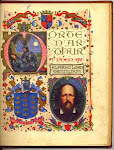







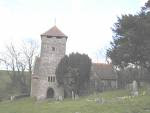
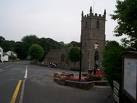


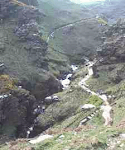

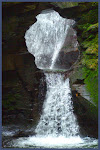


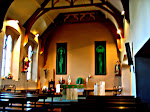









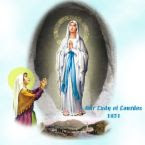


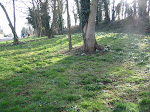

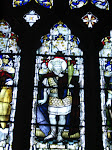
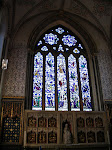
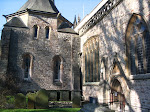
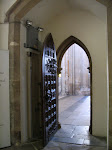
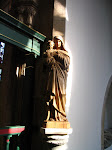


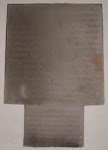



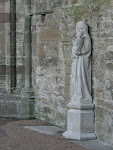









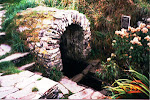


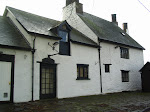
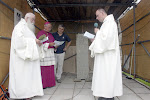



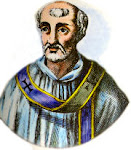
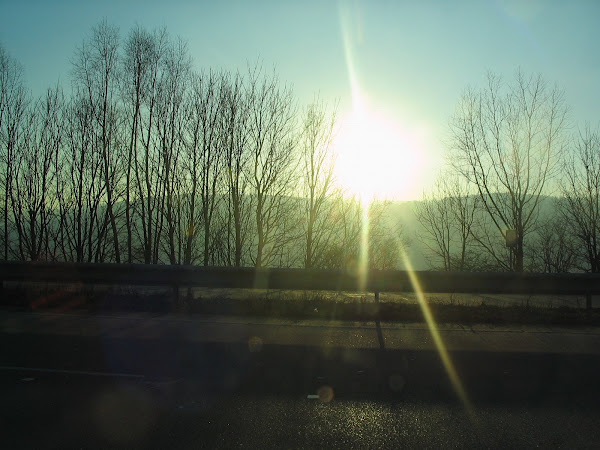


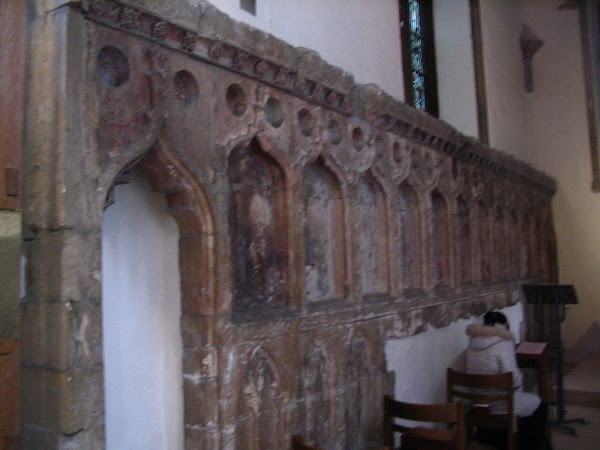
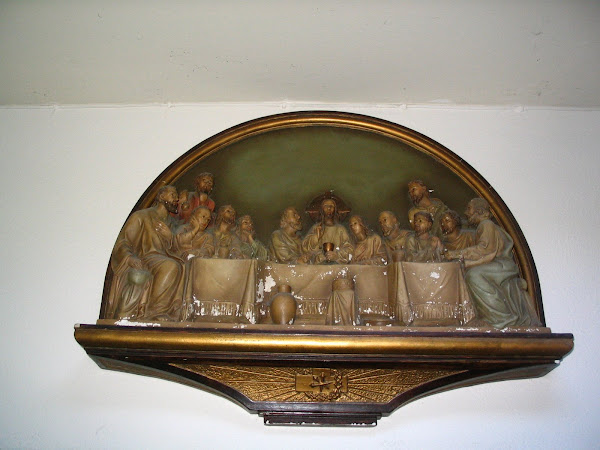




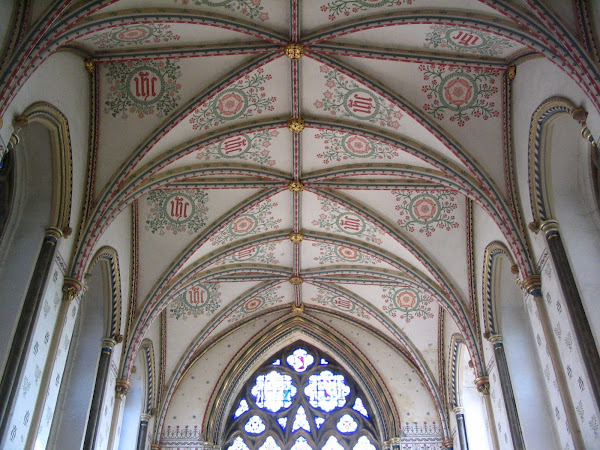


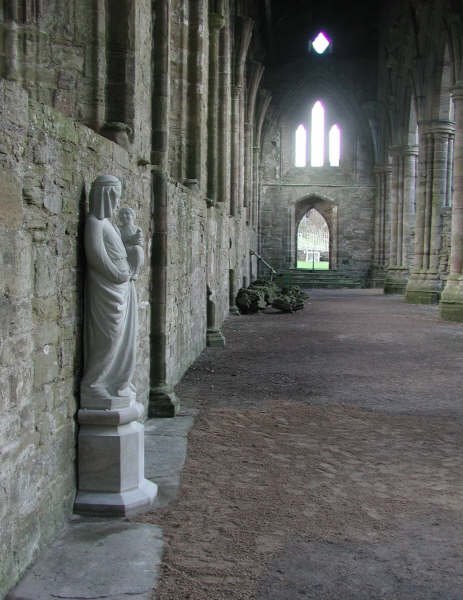
No comments:
Post a Comment